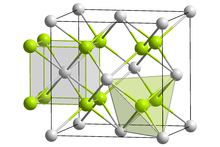Potassium polonide is a chemical compound with the formula K2Po. It is a polonide, a set of very chemically stable compounds of polonium.[2][3]
 Crystal structure of potassium polonide
__ K+ __ Po2- | |
| Names | |
|---|---|
| Preferred IUPAC name
Potassium polonide | |
| Identifiers | |
3D model (JSmol)
|
|
| |
| |
| Properties | |
| K2Po | |
| Molar mass | 287.18 g/mol |
| Appearance | greyish[1] |
| Related compounds | |
Other anions
|
Potassium oxide Potassium sulfide Potassium selenide Potassium telluride |
Other cations
|
Lithium polonide Sodium polonide Rubidium polonide Caesium polonide |
Except where otherwise noted, data are given for materials in their standard state (at 25 °C [77 °F], 100 kPa).
| |
Characteristics
editPotassium polonide is thermally more unstable and has stronger electron affinity than potassium telluride (K2Te).[2][3]
Production
editPotassium polonide may be produced from a redox reaction between polonium hydride and potassium metal:[2][3]
- H2Po + 2 K → K2Po + H2
It may also be produced by heating potassium and polonium together at 300–400 °C.[1] At higher temperature, this reaction may reverse.
Crystal structure
editLike sodium polonide, potassium polonide has the antifluorite structure.[2][3]
References
edit- ^ a b Bagnall, K. W. (1962). "The Chemistry of Polonium". Advances in Inorganic Chemistry and Radiochemistry. New York: Academic Press. pp. 197–230. ISBN 9780120236046. Retrieved June 17, 2012.
- ^ a b c d Greenwood, Norman N.; Earnshaw, Alan (1984). Chemistry of the Elements. Oxford: Pergamon Press. p. 899. ISBN 978-0-08-022057-4.
- ^ a b c d Moyer, Harvey V. (1956), "Chemical Properties of Polonium", in Moyer, Harvey V. (ed.), Polonium, Oak Ridge, Tenn.: United States Atomic Energy Commission, pp. 33–96, doi:10.2172/4367751, TID-5221